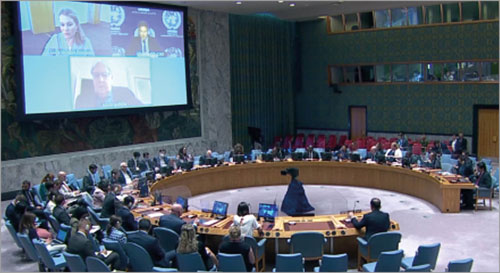Attendees at the UN Security Council Meeting, including Norway, China, the UN representatives in Afghanistan, and the head of the Afghanistan Permanent Mission to the UN, stressed the need to uphold women’s right to employment and education.
Naseer Ahmad Faiq, Chargé d’Affaires of the Afghanistan Permanent Mission to the UN, said that UN should have a role beyond the coordination and distribution of humanitarian aid.
“I call on the Taliban to protect and respect the fundamental human rights of all citizens of Afghanistan without prejudice based on gender, ethnic and religious identity. This includes reopening girls’ schools and restoring women’s full human rights,” Faiq said.
While speaking at the conference, Markus Potzel, the UN deputy special envoy for Afghanistan, said that not upholding human rights, especially the rights of women and girls, is the reason the Islamic Emirate has not been recognized by the international community.
“First, the current regime in Afghanistan has not been recognized by any member of the international community. The reasons for that are clear. The international community has norms regarding human rights, especially those of women and girls; representative governance; and international collective security. Afghanistan is part of this international system and the Taliban need to adhere to their international obligations but instead request recognition based on the fact that they have secured territorial control,” Potzel said.
Martin Griffiths, Under-Secretary-General for Humanitarian Affairs and Emergency Relief Coordinator, briefed the council, saying that Afghanistan’s de facto leaders must do their part, female humanitarian aid workers must be allowed to work unhindered and girls must be allowed to continue their education. “There are many musts,” he said, “but there are many opportunities — the path is clear, and the dangers equally so,” said UN aid chief Martin Griffiths.
Women’s rights activists calling for support of girls’ education asked the international community to put more pressure on the Islamic Emirate.
“We hope that the United Nations Security Council meeting will result in maximum pressure on the ruling group to reopen the doors of girls’ schools,” said Maryam Arween, a women’s rights activist.
“The reopening of girls’ schools depends on changing the world’s opinions and actions towards the Taliban,” said Farah Mustafawi, another women’s rights activist.
The Islamic Emirate said that the rights of citizens have been respected, based on Islamic laws.
“Rights are also interpreted differently in different countries; I believe that any understanding of rights used in the West cannot be used in Afghanistan. We are committed to Sharia-compliant women’s rights for all, and we work to ensure that people’s rights are upheld,” said Zabiullah Mujahid, spokesman of the Islamic Emirate.
A year has passed, but it is still unclear when schools will reopen and women will start working, although several countries around the world previously voiced their concerns in a number of international meetings.










